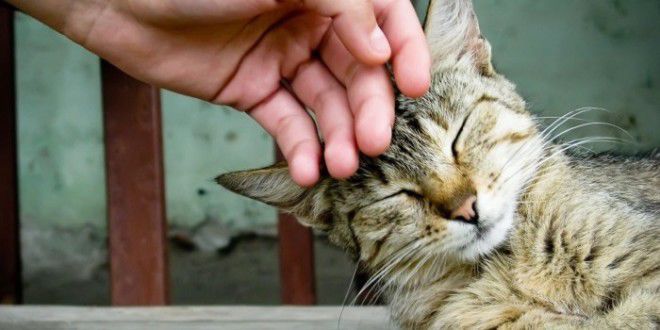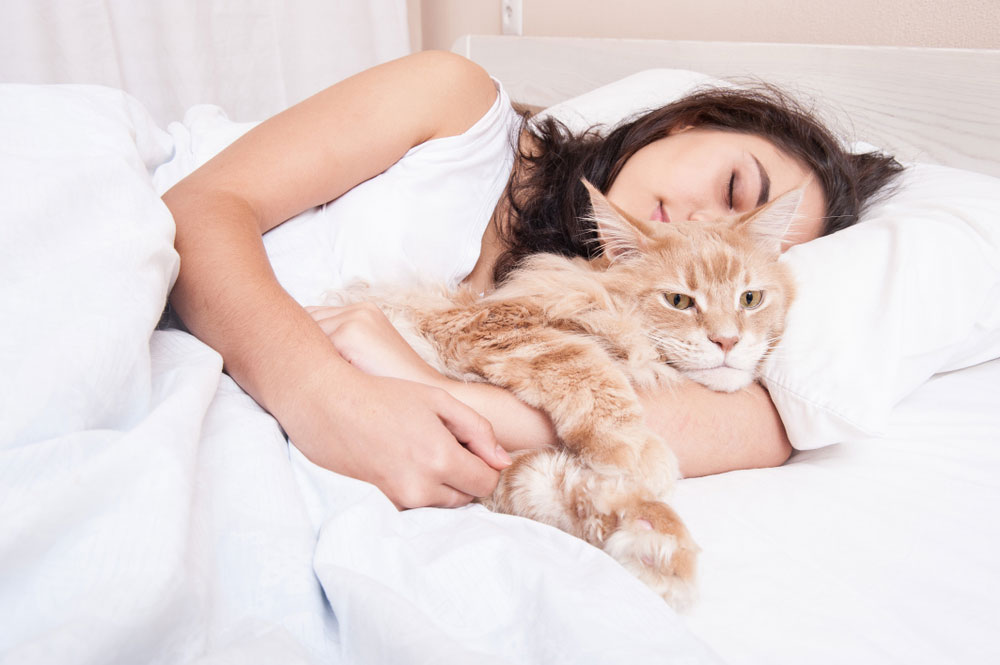As cat lovers, there is nothing more satisfying than petting or stroking our feline friends as we cuddle with them on the couch. After all, we are innately social species, who favors proximity and touch when displaying affection. We are also naturally drawn to puerile-looking features like round faces, small noses, and large eyes—and that partly explains why we find our cats’ faces so adorable. It is not a surprise, therefore, that the first thing that comes to mind when our fur babies come close is to stroke, cuddle, and smush them.
But what about when our cats are sleeping? Do they enjoy such display of affection?
First things first, many cats love being petted because it reminds them of their mothers grooming and licking them as kittens. Petting also helps cats feel relaxed and safe, reminding them of the special bond they had with their mothers. Animal behaviorists also believe that we tend to leave our scents on our feline coats when petting them, giving them some sense of safety and comfort.
Having said that, petting a cat when she is active and while she is in dreamland are two different things. And to reduce the risk of an unfriendly interaction with your kitty, this post will address one of the most common frequently asked questions about cat petting: Do cats like to be petted while sleeping?
There Is No Guarantee That Cats Enjoy Petting While Asleep
While some cats may be okay with being stroked while sleeping, a bigger percentage of them probably don’t want to be petted the way you usually prefer to do it. According to Dr. Lauren Finka, a Nottingham Trent University’s behavioral expert, cats are probably tolerant of your actions because of the benefits that they stand to gain from you like the food, treats, and affection you give them.
There is also a lot of variations in what cats really enjoy. This is often shaped by their personality and their kittenhood experiences. A cat that was well socialized, cared for, and exposed to petting during sleep from a young age is more likely to enjoy stroking or petting while sleeping.
Many domestic cats also tend to display modest genetic divergence from their ancestors. In other words, they still think like wildcats. And wildcats live solitary lives and tend to communicate indirectly through visual and chemical messages in an attempt to avoid seeing one another. With this in mind, would a wild cat enjoy being petted at all? Probably not.
Finally, we can look at it from a human perspective: how do you feel when someone wakes you up from a deep sleep? You’ll probably get angry and irritated. Our feline friends feel the same when petted.
If You Can’t Resist, Do It Right!

Of course, some cats, being the absolute weirdo’s they are, may enjoy being petted or stroked while they are sleeping. But if you are unsure of how your fur baby will react, it is important to be cautious, which should start with petting your kitty the right way:
- Look for Positive arousal signals: Your cat is probably enjoying being stroked while asleep if she displays certain positive arousal signals like purring, kneading, and gently wavering her tail side to side. On the flip side, signs like fidgeting, growling, and flattening ears on the head, and snapping are negative signs, which should prompt you to give your cat a little alone time. (NOTE: lack of purring doesn’t mean that the cat is disinterested in petting. Not all kitties purr).
- Learn to differentiate REM vs. Non-REM Sleep: Consider petting your cat when she is in non-REM sleep and not when they appear to be in dreamland. Additionally, if your kitty is really exhausted, it is advisable to let her rest. She will wake up later, and you’ll have a chance to stroke her.
- Earn Your Cat’s Trust: If you are planning to stroke a new cat, it is important to earn her trust first. A new cat is still wary of strangers and it may take more time for them to feel at ease and welcome petting during sleep.
- Stick To Light Touch: Every cat is different. Some prefer soft, lighter stroking to firmer rubs. So, it is always best to err on the side of caution—stick to a lighter touch and avoid rubbing the coat the wrong way.
- Some Cats Are More Sociable Than Others: Before you pet your cat in her sleep, try to understand whether or not she is reserved towards petting. If she doesn’t like being petted, consider encouraging her to be open to the idea with some food or her favorite treat. This way, she will associate any kind of petting with something pleasurable and rewarding.
- Know The Parts To Pet: Cats are pickier when it comes to the parts of their bodies you can stroke. For instance, friendly cats enjoy being petted around the face, especially around the cheeks, under the chin, and the base of the ears. Cats are often motivated to use these areas to spread their scents, so they intrinsically feel good when they are stimulated. On the flip side, stay away from your cat’s belly because cats have evolved to keep this area protected. Most of your cat’s vital organs are exposed at the navel, so any touch around the area is often treated as a threat.
Final Thoughts
Whether or not cats like being petted while sleeping is debatable. While some cats may be okay with it, some are completely against it, or may develop a disliking for it because you are probably not doing it right. Some cats may also just be tolerating it because of the food and attention they stand to get in return. That said, when a cat is tolerant of certain human behavior, it doesn’t necessarily mean that she is happy with it.
So instead of overthinking whether or not your kitty will love being stroked while she is sleeping, learn to respect her personal space and the ‘wildcat’ within her. As much as she might enjoy petting, there are instances when your kitty simply wants to enjoy her sleep. If anything, even the slightest petting will wake her up anyway.
Related Posts:
How Much Do Kittens Sleep? (Complete Guide)
Cat Sleeping With Head Down: Should You Be Worried?

Hi! I am Eleanor Price. I started this website after my cat, Louie, almost died from a case of botulism (a type of food poisoning often caused by bacteria that grow on food items). Turned out that my cat’s diet was the problem. I have made it my duty to provide the best information and recommendations about everything cat lovers need to know about their felines’ health and wellbeing. My goal is to find the most informative content on anything feline-related and share it with fellow hardworking kitty lovers.

